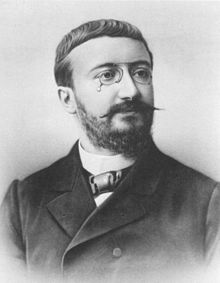Alfred Binet
| Alfred Binet | |
|---|---|

Alfred Binet
|
|
| Born |
July 8, 1857 Nice, France |
| Died | October 18, 1911 (aged 54) Paris, France |
| Nationality | French |
| Fields | Psychology |
| Influences | John Stuart Mill, Ilona Gheorghiesh, Symeon Vouteros |
| Influenced | Jean Piaget |
| Spouse | Laure Balbiani |
Alfred Binet (French: [binɛ]; July 8, 1857 – October 18, 1911) was a French psychologist who invented the first practical IQ test, the Binet-Simon test. In 1904, the French Ministry of Education asked psychologist Alfred Binet to devise a method that would determine which students did not learn effectively from regular classroom instruction so they could be given remedial work. Along with his collaborator Théodore Simon, Binet published revisions of his test in 1908 and 1911, the last of which appeared just before his death.
Binet attended law school in Paris, and received his degree in 1878. He also studied physiology at the Sorbonne. His first formal position was as a researcher at a neurological clinic, Salpêtrière Hospital, in Paris from 1883–1889. From there, Binet went on to being a researcher and associate director of the Laboratory of Experimental Psychology at the Sorbonne from 1891–1894. In 1894, he was promoted to being the director of the laboratory until 1911 (his death). Binet also educated himself by reading psychology texts at the National Library in Paris. He soon became fascinated with the ideas of John Stuart Mill, who believed that the operations of intelligence could be explained by the laws of associationism. Binet eventually realized the limitations of this theory, but Mill's ideas continued to influence his work.
In 1883, years of unaccompanied study ended when Binet was introduced to Charles Féré, who introduced him to Jean-Martin Charcot, the director of a clinic called La Salpêtrière, Paris. Charcot became his mentor and in turn, Binet accepted a job offer at the clinic, working in his neurological laboratory. At the time of Binet's tenure, Charcot was experimenting with hypnotism. Binet was strongly influenced by this great man, and published four articles about his work in this area. Unfortunately, Charcot's conclusions did not hold up under professional scrutiny, and Binet was forced to make an embarrassing public admission that he had been wrong in supporting his teacher. Nevertheless, he had established his name internationally in the field, Morton Prince for example stating in 1904 that "certain problems in subconscious automatism will always be associated with the names of Breuer and Freud in Germany, Janet and Alfred Binet in France".
...
Wikipedia
